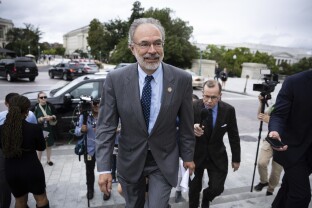As Mike Johnson tries to get fiscal hawks onboard with his reconciliation bill, the speaker is now planning on including a once-unthinkable line item: a debt ceiling hike.
Plenty of Republicans have resisted voting for debt limit raises in the past, meaning Democrats have had to pick up the GOP’s slack. The result is that, typically, debt ceiling bills are bipartisan. The problem is that the whole point of the reconciliation bill is that it isn’t bipartisan.
At the moment, Johnson’s decision to include a debt ceiling hike — or to “probably” include it, as he told reporters on Friday — is delighting conservatives.
“I think, and we think, that it should be in reconciliation,” former House Freedom Caucus Chair Scott Perry told NOTUS on Friday. “Why would we deal with the Democrats on the debt ceiling?”
But as Republican leaders know all too well, Freedom Caucus celebration now doesn’t guarantee support later.
When asked if he’d vote for the final reconciliation bill with a debt ceiling hike attached, Perry laughed.
“That’s like saying, ‘Would you commit to buying a car?’” Perry said. “Well, what kind of car are we talking about?”
Johnson’s surprise announcement that the debt ceiling will “probably” be in reconciliation is a stark reversal from where Republicans were last month. The old plan was to tie the debt ceiling to disaster aid to try to win over Democrats, once again relying on the other party to primarily supply the votes so certain Republicans could keep their debt limit purity intact.
The last time Republicans were forced to vote on the debt ceiling, fiscal hard-liners demanded huge cuts — and even when many of those cuts were included, many still voted against the legislation.
This time around, Republicans are hopeful that the reconciliation bill will have so many conservative priorities, and that it will include so many spending cuts, that a debt limit raise would be a no-brainer.
“Why not put it in?” Rep. Ralph Norman asked NOTUS.
But his caveat — “as long as we have cuts for it” — seems to answer the question.
Republicans are still hammering out how much money their reconciliation bill would save. But a number of other proposals — like making the 2017 tax cuts permanent, lifting the cap on how much individuals can deduct their state and local taxes on their federal bill and removing taxes on tips — threaten to blow up the budgetary impact of the legislation.
And those priorities could complicate passing the bill, even before an ideological poison pill like a debt limit increase is included.
Rep. Chip Roy said he was supportive of putting the debt ceiling in reconciliation. But, once again, he emphasized that the overall legislation needed real spending cuts.
“If we include debt ceiling in with cuts, then you’re gonna have a lot of us more amenable to the debt ceiling,” Roy said.
Freedom Caucus Chair Andy Harris was even more bullish on the reconciliation bill’s chances if it included the debt limit, telling NOTUS that the Freedom Caucus has always supported putting the debt ceiling in reconciliation. He also said he believes there would be enough votes to pass the measure.
“If the Freedom Caucus backs it, I’m not sure who’s not going to,” he said.
Leaving aside that there are Republicans outside of the Freedom Caucus who could still be a problem — like Reps. Thomas Massie, Tim Burchett and Marjorie Taylor Greene — getting the HFC to back the reconciliation could still be a problem.
A major reason why leadership has, to this point, resisted including the debt limit is because it adds a whole new ideological dimension to the whip effort. And whereas many Republicans might be willing to fudge the math on the deficit impact of tax cuts, they’re less willing if the legislation also raises the debt ceiling.
President Donald Trump and GOP leaders have been trying to find an answer to this problem in recent days. House Republicans have been meeting with the president to discuss what cuts — and how much — might be sufficient to win over near-unanimous support in the GOP. One source familiar with the conversation told NOTUS that there had been discussion about making the floor $2 trillion, but that number has consistently been in flux.
The source familiar with the conversations said Republicans had been looking at Medicaid cuts, specifically block grants, as a way to offset the GOP’s tax cuts. But again, that introduces a whole other set of political problems.
As far as the Freedom Caucus is concerned, including the debt limit is a solid way to ensure actual cuts. Plus, it cuts out Democrats from the equation. If Republicans rely on Democrats for a debt ceiling raise in another piece of legislation, that almost certainly means Democrats will get something in return for their votes.
As Norman said, Trump wants the debt ceiling to be included in reconciliation so he doesn’t have to “be at the mercy of Chuck Schumer.”
Still, the plan remains fluid. And a senior White House aide clarified that Trump has not “dictated” that the debt ceiling should be part of reconciliation.
“It just has to be handled,” the aide said.
—
Reese Gorman is a reporter at NOTUS.
Sign in
Log into your free account with your email. Don’t have one?
Check your email for a one-time code.
We sent a 4-digit code to . Enter the pin to confirm your account.
New code will be available in 1:00
Let’s try this again.
We encountered an error with the passcode sent to . Please reenter your email.


